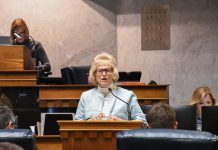Dave Stafford for www.theindanalawyer.com
A Ripley County man whose drunken-driving counts were discharged by a trial court after he moved for dismissal under the speedy trial rule may be haled back into court on those charges after the state successfully appealed.
The Indiana Court of Appeals on Tuesday reversed dismissal of the charges in State of Indiana v. Daniel L. Myers, 69A01-1708-CR-1805. Daniel Myers was charged with three counts of operating while intoxicated on Dec. 3, 2015. After numerous delays — some of which were attributable to Myers — the Ripley Superior Court at a pretrial hearing on May 26, 2017, set a trial date, without objection, of Nov. 14, 2017.
At the pretrial hearing, the court asked the state and defense if there were any issues under Indiana Trial Rule 4(C), which generally requires a trial date be set within one year of the filing of charges. Neither Myers’ defense nor the state said there were any such issues.
But last June, Myers’ defense said it learned that the one-year period had expired, meaning Myers was entitled to dismissal of the charges under Trial Rule 4(C). The trial court agreed and dismissed the case, prompting the state’s appeal.
“Here, it is undisputed that Myers did not object during the one-year period†as required, Chief Judge Nancy Vaidik wrote for the panel. “The State had 20 days remaining in the one-year period when the pretrial conference was held on May 26. At that conference, the trial court asked either party if there was any Rule 4(C) issue, but neither party expressed any concern.â€
“Trial was then set for November 2017. Myers did not object,†Vaidik continued. “Once the trial court asked about any Rule 4(C) issue, Myers was made aware that an issue may exist. Myers, however, did not calculate the Rule 4(C) deadline until June 22 — 7 days after the one-year period expired — and then moved for discharge.â€
Myers cited Havvard v. State, 703 N.E.2d 1118, 1121 (Ind. Ct. App. 1999), which held, “When a defendant learns within the period provided by the rule that the case is set for trial at a time beyond the date permitted, the defendant must object to such a trial setting at the earliest opportunity.â€
“(W)e are not convinced that the use of the word ‘learns’ in Havvard was meant as an invitation for a defendant to calculate the Rule 4(C) deadline at his convenience, as Myers contends,†Vaidik wrote. “This would eliminate the defendant’s burden to object during the one-year period to a trial date that is set beyond the deadline. Ideally, Myers’s attorney would have been tracking the Rule 4(C) deadline since the beginning of the case and would have objected as soon as the court mentioned a November 2017 trial date. At the very least, Myers’s attorney should have calculated the deadline reasonably soon after the pretrial conference — at which the trial court specifically inquired about Rule 4(C) — and objected with time still remaining in the one-year period.â€
“Instead, Myers waited nearly thirty days to do the calculation and alert the court that the trial was set for a date beyond the one-year period,†Vaidik continued. “Because Myers failed to object to the November 2017 trial date before the one-year period expired, he acquiesced to the trial date and waived any claim to discharge under Rule 4(C).
“ … Of course, this does not mean that the State is now free to try Myers whenever it pleases. As of May 26, the State had 20 days left on its one-year period under Rule 4(C),†Vaidik wrote. “Therefore, within 7 days of this opinion being certified, the trial court shall hold a hearing and, if Myers demands it, set a trial within 20 days of the hearing. If court congestion prevents the court from setting a date within that timeframe, the court should make an explicit finding to that effect and set the trial for the next available date.â€




